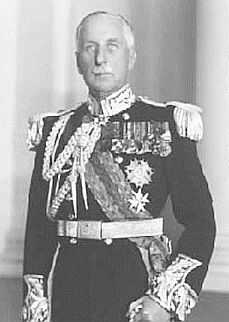Alexander Hore-Ruthven, 1st Earl of Gowrie
|
|
Alexander Gore Arkwright Hore-Ruthven (pronounced Hore-Riven), 1st Earl of Gowrie VC, KBE, PC (6 July 1872 - 2 May 1955), tenth Governor-General of Australia, was born in Windsor, Berkshire, England, the second son of the 8th Baron Ruthven. Hore-Ruthven was educated at Eton College, but was withdrawn fromthe school due to poor eyesight.
| Contents |
Military career
In 1898 Hore-Ruthven joined the British Army. During the Sudan Campaign he was a Captain in the 3rd Battalion of The Highland Light Infantry. On 22 September 1898 during the action at Gedarif, Hore-Ruthven saw an Egyptian officer lying wounded within 50 yards of the advancing Dervishes, who were firing and charging. He picked up the wounded officer and carried him towards the 16th Egyptian Battalion; he had to drop his burden several times in order to fire upon the Dervishes and check their advance, but his action undoubtedly saved the officer's life; for his bravery, he was awarded the Victoria Cross.
In 1905 Hore-Ruthven became an aide-de-camp to Lord Dudley, then Lord Lieutenant of Ireland. In 1908 Dudley was appointed Governor-General of Australia, and Hore-Ruthven went with him as military secretary. In the same year he married Zara Pollok, with whom he had one son. He left Australia in 1910 and returned to military service in India. During World War I he served in France and at Gallipoli, where he was severely wounded. He finished the war as a Brigadier-General, and commanded British forces in Germany between 1919 and 1920. After this he held various Army staff positions until 1928, when he was appointed Governor of South Australia.
He was in London when the third Bodyline Test cricket match in Adelaide caused Anglo-Australian political tension in 1933, and he played a significant part in smoothing relations through his meetings with the British Secretary of State for Dominion Affairs J.H. Thomas. His term as Governor ended in 1934, and he was then appointed Governor of New South Wales, with the title Baron Gowrie.
Victoria_Cross.jpg
Thumb
With his military record and experience, Gowrie was seen as an obvious choice to succeed Sir Isaac Isaacs when he retired as Governor-General in 1936. In accordance with established practice, the Prime Minister, Joseph Lyons, was offered several alternatives, but Gowrie was the obvious candidate, as Lyons had no intention of appointing another Australian to the post.
In office, Gowrie was a popular if unobtrusive figure in Australia. The days when Governors-General exercised significant power, or even participated in negotiations between the Australian and British governments, had now passed, but Gowrie set a precedent in 1938 when he toured the Netherlands East Indies at the invitation of the colonial administration. This was the first time that a Governor-General had represented Australia abroad.
In April 1939 Lyons died suddenly and Gowrie commissioned Sir Earle Page, the leader of the Country Party, as Prime Minister until the United Australia Party could choose a new leader: this was the only circumstance in which the Governor-General still had some personal discretion.
Gowrie's political skills were tested again after the 1940 election, which left the UAP Prime Minister, Robert Menzies, dependent on the votes of two independent members to stay in power. When the UAP dropped Menzies as leader, the independent members voted to put the government out. Gowrie sent for them and demanded that they give him a guarantee that if he commissioned the Australian Labor Party leader, John Curtin, they would support him and end the instability in government.
During World War II Gowrie saw it as his duty to support the government and the British Empire, and also the troops. In 1943 he undertook a four-week tour of inspection of Allied Defence Forces in northern Australia and New Guinea. Shortly before undertaking this tour, Gowrie and his wife had learned that their son, Patrick, had been killed in Libya the previous year.
Retirement
Gowrie's term ended in September 1944 after which he returned to Britain, where he was created Earl of Gowrie and appointed Deputy Constable and Lieutenant-Governor of Windsor Castle. In 1948 he was elected president of the Marylebone Cricket Club. He died in May 1955 at his home in Gloucestershire.
Governor Generals
| Preceded by: Sir George Bridges | Governor of South Australia 1928–1934 | Succeeded by: Sir Winston Joseph Dugan | |||
| Preceded by: Sir Philip Game | Governor of New South Wales 1935–1936 | Succeeded by: Sir David Anderson | |||
| Preceded by: Sir Isaac Isaacs | Governor-General of Australia 1936–1945 | Succeeded by: The Duke of Gloucester
External Links
Sources
|

